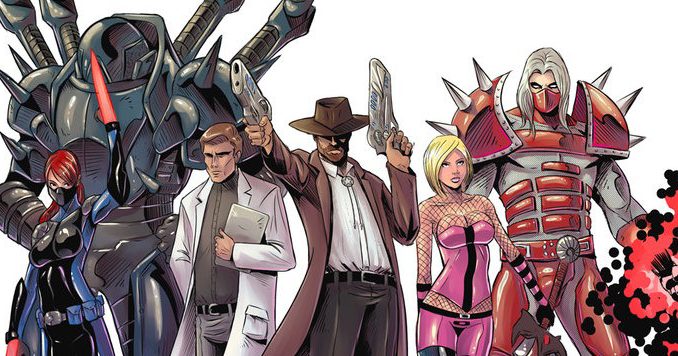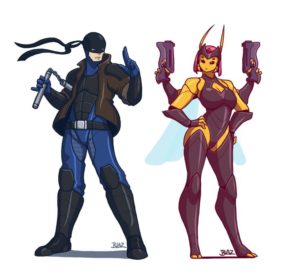
Like most RPG nerds that got their hands on Genesys from Fantasy Flight Games, my mind went wild with genres, ideas, and tropes to play with using the system. I’ve thought of about everything there is. However, my mind mostly goes to the one RPG that I played when I was a kid: Heroes Unlimited. It was a perfect d20 system with all kinds of superhero origins, powers, equipment, etc. The game had it all and me and my friends played it a lot. We had a ton of fun making characters mostly.
When looking at Genesys, some have said that it doesn’t look like there is much meat on the bone. That there isn’t enough specific information to make a game. Well, that’s kind of the point. It’s a toolbox. It’s meant for you to take the system only and make your own game. In the last two pages of the book, the game gives you ideas on how to run a superhero game. They talk about giving your characters “super characteristics” as well as extra XP and new minion rules. All of these make a lot of sense and you should incorporate them.
This column, with help from the lists, concepts, and ideas in the Heroes Unlimited RPG, is a quick little start-up guide to get your creative juices flowing to make your own superhero campaign using Genesys!
Archetypes
First thing was deciding between Species or Archetypes. Because 90% of superheroes are human, it made more sense to pick from Archetypes. So, I would start your PC off with 2s in all characteristics, allowing them to move one up to a 3 and another down to a 1 prior to beginning to spend XP. I’ve pulled my favorites from the RPG and all the comic stuff I know. Here would be my choices for my players:
- Alien
- Human-like
- Humanoid (Has an unusual physical characteristic like large ears, different skin color, etc)
- Insect-like
- Classic Alien
- Amphibian
- Demonic
- Feline-like
- Bionics (Consider the sponsoring organization, motive for getting the cybernetics, and status with the organization.)
- Healthy Specimen
- Lost both arms/legs
- Paraplegic
- Completely Paralyzed
- Experiment (Consider the nature of the experiment and the type that went wrong… or right. Possibly consider side-effects or physical consequences of the experiment.)
- Chemical
- Radiation or other energy
- Other
- Hardware (This is your Punisher or Batman-type hero. Consider areas of expertise and what makes them so good at what they do.)
- Electrical genius
- Mechanical genius
- Weapons expert
- Analytical genius
- Computer/Hacking genius
- Magic (Dr. Fate, Dr. Strange, or Zatanna could be examples here. Consider how they obtained their magical powers.)
- Enchanted Weapon
- Enchanted Object
- Mystic Study
- Mystically Bestowed
- Mutant (Consider the reason for the mutation, as well as side-effects and unusual physical characteristics, much like with the Experiment archetype.)
- Unknown
- Accident w/ “strange” stuff
- Deliberate experimentation
- Exposure to chemicals
- Radiation
- Mutant animal
- The “Mega Hero” (Superman or Wonder Woman; consider their “Achilles heel” or weakness that can stop them.)
- Psionic
- Robotic (Like a Droid in the SWRPG. Consider its intelligence, programming, attributes, equipment, etc.)
- Robot vehicle (Transformer)
- True Robot/Machine Body
- Exoskeleton
- Android
- Special Training
- Martial Arts Master
- Vigilante
- Secret Operative/Spy
- Stage Magician/Master of Illusion
- Super Sleuth
 Powers
Powers
After you choose the Archetype you’ll want to think about what powers the character possesses. Depending on your game, you can choose to use the alternate Magic rules on page 210, for example, or create Talents that become their powers. If you want to use the alternate Magic rules, it could work just like a Magic-user in the examples. If the hero has fire powers, for example, he can increase the difficulty of the check depending what he wants to do with the fire. Then, treat it just like the Magic rules in the book. In other words, give them a big, cool base power, and then let them creatively, narratively use them in game.
However, if you’d like to create talents that your PCs can work towards depending what Archetype they’ve chosen above, the following lists can help you create those powers. You will need to decide what the narrative effects are of these powers and how to flesh them out, as these are meant to get your mind churning with ideas! There are gobs of these we can think of, but this is just a rough start. For me I would allow both GM and Players to be able to invent talents and powers with GM approval.
Minor Abilities (Tier 1/2/3 Talents)
- Super Sight
- Clock Manipulation (forward or back a few minutes)
- Bend Light
- Glide
- Nightvision
- Radar
- Flight (Winged or Wingless)
- Adhesion
- X-Ray Vision
- Float/Levitate
- Sense of Smell
- Impervious to Fire/Heat
- Impervious to Ice/Cold
- Breathing Under Water
- Body Weapons (Inside body parts/part of body)
- Extraordinary Ability (perhaps temporarily increase characteristic or upgrade checks):
- Strength
- Speed
- Endurance
- Mental Affinity
Major Powers (Tier 3/4/5 Talents)
- Animal Metamorphasis
- Copy Physical Structure
- Invisibility
- Energy Absorbtion
- Item Reduction
- Control Power:
- Radiation
- Static Electricity
- Darkness/Light
- Insects
- Fire
- Water
- Ice
- Earth
- Air
- Weather
- Plants
- Shape Change
- Create Force Field
- Gravity Manipulation
- Growth/Shrinking
- Cloaking
- Animal Abilities (Pick your favorite animal and create a power around it.)
- Tentacles
- Super Speed
- Negate Other Super Powers
- Magnetism
- Stretching
- Invulnerability
- Sonic/Sound
- Teleport
- Link w/ Machines/Computers
- Vibration
- Intangibility
So these are really long lists just designed to help if you’re thinking about making a campaign around super heroes. Hopefully these give you all sorts of ideas on how to get your campaigns kicked off right, and where to start.
